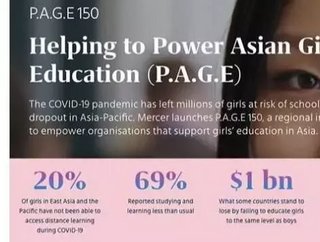Mercer launches education initiative for girls across Asia

Global human capital consultancy Mercer has unveiled a new education initiative for girls across Asia, the Middle East, and Africa. Dubbed P.A.G.E 150, (Powering Asian Girls’ Education, with a nod to parent company Marsh McLennan’s 150th anniversary), the programme provides 1,500 hours of support across the various regions to help address the impact on girls’ education stemming from the pandemic.
According to Renee McGowan, President of Mercer’s AMEA region, the pandemic has drawn urgent attention to the risks of growing gender gaps,a nd through this initiative, “we hope to reverse some of these losses and help make a difference to our workforce of the future”.
How exactly will the initiative work?
Mercer will direct its volunteer hours over the next 12 months toward supporting existing social enterprises that work to improve access to education for girls from disadvantaged backgrounds, with many organisations also hit hard by the pandemic in terms of funding and personnel.
By supporting them directly, “we can help these organisations build back better and stronger so they can expand and support even more girls through education,” says McGowan.
As part of Mercer’s pledge, the consulting firm will focus on sharing its own human capital expertise, by supporting the nominated social enterprises with investment advisory, through HR projects such as re-skilling and career pathway designs, or by helping to strengthen their health and benefits programmes to attract and retain highest level of talent. Enterprises in each of its AMEA markets will receive at least 150 gratis hours of skilled support and guidance.
Pandemic impacts education of girls across Asia
According to UNICEF, 40 million girls in East Asia and the Pacific have been unable to study through distance learning during the pandemic, while over two thirds have reported a reduction in their learning.
Particularly concerning is the threat of permanent drop-outs arising from the widespread school closures, with UNICEF asserting that some 3 million girls in South and West Asia might not return to school due to disruption caused by COVID-19.
Research shows that when a girl’s education is cut short, the impact is felt for generations, both in terms of financial impact, as well as putting young women at greater risk of exposure to violence, forced marriage, and adolescent pregnancy.
World Bank studies reveal that 12 months of additional schooling can equate to an up to 20% increase in wages for women, and with higher incomes, girls can “build better futures for themselves and their families”, says MCgowan. “Girls’ education strengthens economies and societies, giving everyone – including boys and men – the opportunity to fulfil their potential.”
- Mercer BT Super merger makes US$63bn Australia pension fundCorporate Finance
- Business schools innovating for post-pandemic educationLeadership & Strategy
- How Thailand is addressing its digital skills gap – MercerTechnology
- New online INSEAD program to help executives lead todayLeadership & Strategy






